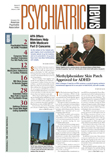While psychiatry is part of the movement to bring medicine to the masses via computer, communicating with patients via e-mail and the Internet can also increase psychiatrists' exposure to liability for a variety of reasons, say risk-management experts.
The fact that electronic communication can bridge great distances and instantly bring information to patients is the very thing that makes it so risky, according to Jacqueline Melonas, J.D., R.N., M.S., vice president of risk management at Professional Risk Management Services, manager of the APA-endorsed Psychiatrists' Professional Liability Insurance Program.
“The practice of medicine is controlled by physical jurisdictions,” Melonas told Psychiatric News in a recent interview. “Electronic communications, however, cross jurisdictional boundaries effortlessly.”
Practicing across state lines—dispensing medical advice to a person in another state, for instance—may raise problems with licensing restrictions; most states require physicians to be fully licensed in a state in order to treat individuals in that state.
According to Melonas, some states explicitly prohibit unlicensed telemedicine, and some have created “a limited exception to licensing for the purposes of telemedicine.” She noted, however, that it is not clear whether such telemedicine laws apply directly to cybermedicine—providing medical services via e-mail or the Internet. Telemedicine refers to the provision of health care services from a distance using audio, video, and computer technology. Often, physicians use videoconferencing to diagnose an illness and provide medical treatment.
Laws May Conflict
Trying to determine which laws apply when the physician and his or her patient are located in different states is not easy, according to Melonas.
States have unique laws pertaining to a number of critical topics, such as documentation requirements, duty to warn of a dangerous patient, duty to report abuse, requirements for informed consent to treatment, and commitment standards.
When psychiatrist and patient are in different states, “it may not be clear which state's laws would prevail, should the laws differ,” Melonas noted.
In addition, professional liability insurance companies cannot provide insurance coverage for the unauthorized practice of medicine, which would include practicing in violation of another state's laws or regulations.
“To avoid or minimize the risks of practicing across state lines, if a psychiatrist decides to provide some treatment via e-mail or the Internet, it should only be done with patients located in the state in which he or she is licensed to practice,” Melonas said.
E-mailing a patient who is out of state on an infrequent basis, especially for an administrative purpose, can be most closely compared with telephoning a patient who is out of state, she added.
Talking to a patient who is in a state where the doctor is not licensed may not be a problem in some instances. For example, a patient who is on vacation may need to reach his or her doctor about a medication side effect.
However, a psychiatrist who is conducting psychotherapy via phone with a patient who is in a state where the doctor is not licensed could run afoul of state licensing requirements.
At a minimum, psychiatrists have a duty to meet the standard of care when treating patients. The standard of care is not a clinical concept, but a legal one.
Although its exact definition differs from state to state, it can be viewed as “the degree of skill, care, and diligence exercised by members of the same profession or specialty practicing in light of the present state of medical science,” according to Melonas.
Does dispensing medical advice or information to a patient on the other end of a computer meet the standard of care? Or can a psychiatrist be held liable for misinformation located on a Web site to which he or she is linked?“ These questions have not yet been answered,” Melonas said.
Problems may arise when psychiatrists attempt to assess a patient via e-mail, since they can't see or hear the patient. “Without the ability to interpret facial expressions, body language, or vocal intonations, the psychiatrist is at a disadvantage when assessing the patient's condition,” she explained.
Privacy May Be Compromised
While speed and convenience are major reasons psychiatrists may want to use e-mail to communicate with patients, e-mail could compromise a patient's privacy and cause other problems.
For instance, e-mail messages, like postcards, can be read by others as they pass from sender to recipient, Melonas noted.
In addition, e-mail messages with sensitive information can be misaddressed and sent to the wrong person, inadvertently forwarded to others, or left on a computer screen for others to see.
Melonas also pointed out that e-mail messages from doctor to patient and vice versa can be delayed from hours to days due to computer or network glitches, which can negatively impact treatment.
She recommended that psychiatrists who communicate with patients via e-mail first obtain a patient's written informed consent to do so. “The informed consent discussion should include an explanation of the benefits, potential risks, and limitations, such as detailed information on what topics will and will not be included in e-mail,” Melonas said.
Prescription refill requests, test results, appointment reminders, questions regarding insurance, and routine follow-up inquiries may be appropriate for inclusion in e-mail messages.
“Cybermedicine,” or treating patients via the Internet or e-mail, is the riskiest activity in which psychiatrists can engage, and those who do should contact their professional liability insurance underwriter to discuss coverage implications, Melonas pointed out.
For example, if a psychiatrist sets up an appointment with a patient, and the patient sends an e-mail asking the psychiatrist to make the appointment much sooner, “what is the psychiatrist's responsibility to find out why the patient wants an earlier appointment?” Melonas asked, “and is it adequate to make this determination and clinical assessment via e-mail?”
These questions get to the heart of another, more central question, she said—whether cybermedicine meets the standard of care.
Electronic prescribing is one area of concern—state licensing boards usually require the physician to have personal interaction with the patient to meet the standard of care, and “more and more states are taking disciplinary actions against physicians who prescribe over the Internet for patients whom they have never personally examined,” she said.
Even a seemingly innocuous activity such as scheduling appointments via the Internet can be problematic. “One psychiatrist's office had patients making appointments directly into the scheduling software from the Internet for several months before realizing that patients could see the entire schedule of appointments, including names, dates, and times—not just their own,” Melonas said.
She pointed out as well that certain Internet activities pose very little risk of liability to practicing psychiatrists. For instance, psychiatrists may post general information about their practice, such as methods of treatment and office hours, or provide general information about mental health, as long as the information is accurate.
Guidelines are available for physicians who want to learn more about communicating electronically with patients. “Guidelines for Physician-Patient Electronic Communications” is posted on the Web at<www.ama-assn.org> and “Model Guidelines for the Appropriate Use of the Internet in Medical Practice” is posted at<www.fsmb.org>. More information about risk management for psychiatrists is posted at<www.prms.com>.▪

